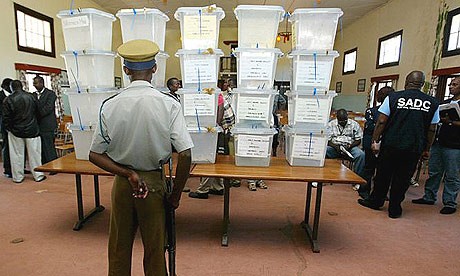
THE election season is indeed upon us. Despite serious contestations being the order of the day between the country’s mainstream political parties (which find themselves in an uneasy coalition government), particularly on the issue of the actual election date, it is apparent that the tenure of this government is coming to an end, an end which has one conclusion – elections.
Report by Voting4zimbabwe.org
The genesis of the inclusive government is itself premised on one major deliverable – the creation of an environment and conditions sufficient for the holding of a credible election.
It needs no introduction that the last election held in Zimbabwe in 2008 lacked credibility and, therefore, precipitated a negotiated government facilitated by Sadc.
Many a scholar have come up with papers trying to explain the voting patterns and trends of that last election, in the process trying to extrapolate and predict the effect on the likely pattern for the impending election, whenever it is held. While a lot has and continues to be said and done about the need to ensure wholesale participation of the electorate in the elections, very little focus has been put in discerning the real issues that the electorate is supposed to vote for.
Specifically, this talks to the various policies, legislative and political alternatives that each of the parties offering themselves for public office is putting forward to attract that vote from the electorate. Proper analysis of politics will tell that this is equally if not more important than actual voting as anyone leaving the ballot booth does not find the vote they have cast as food on the table — rather they will hope that their choice on the ballot paper is able to ensure that the voter is able to put food on their table.
After five years under the leadership of the inclusive government, the platform has indeed provided an intriguing space for those in it, to outdo each other and in the process positioning the parties and their constituent individuals in the favour or otherwise of the electorate, who are the undoubted arbiters in any electoral contest. It is without doubt that the current players in the inclusive government are the front-runners in this election.
There is one glaring reality that has been brought about by the inclusive government and this has been its open portrayal of the various political parties and individuals to the citizens – which will ultimately play a significant role in the eventual capacity of various politicians and their parties to attract votes.
- Chamisa under fire over US$120K donation
- Mavhunga puts DeMbare into Chibuku quarterfinals
- Pension funds bet on Cabora Bassa oilfields
- Councils defy govt fire tender directive
Keep Reading
The on-going confirmation and primary election exercise by the MDC-T is testimony enough to the fact that the voters are indeed the final arbiters in terms of delivering the ultimate verdict on who should govern us from time to time. While other political parties are still to commence this important democratic intra-party exercise, it is becoming clear that the electorate is beginning to look at the ‘track record’ of an individual politician and/or their party as the basis for voting for or against them. And this is where ideally our politics as a nation should be moving to.
The last five years and even the period before then, will provide enough basis upon which the voting citizenry will be able to assess, judge and ultimately decide on who they will cast their ballot in favour of. And this decision will ultimately be made against the background on what each party or individual is able to realistically deliver to ensure that the ordinary citizen is able to attain a livelihood, with the attendant salient bread and butter issues that are associated with a “decent livelihood and existence”.
For the citizens in their wide diversity, as cohorts and social groups, this will imply that any aspiring public office holder and/or their political party ought to have a sound and coherent answer to the various needs of these citizens and be able to adequately sell their idea to the electorate.
It is only on such a basis of choosing leadership can we create a foundation upon which as citizens, we can eventually be able to hold to account those that we mandate to govern.
It is only when as citizens, we can speak the same language with the prospective and serving leaders, in terms of how we interpret the common national vision, that we can be able to attain social justice and sustainable development for all citizens and the nation as a whole. It is only through building such a culture of open dialogue and engagement between leaders, law and policy makers and the citizenry that the country can be able to embrace the new dispensation ushered in by the adoption of the new constitution.
With attendant legislative alignments and other reforms this is supposed to lead to fresh elections to settle the debacle of 2008 and give citizens a government of their choice.










